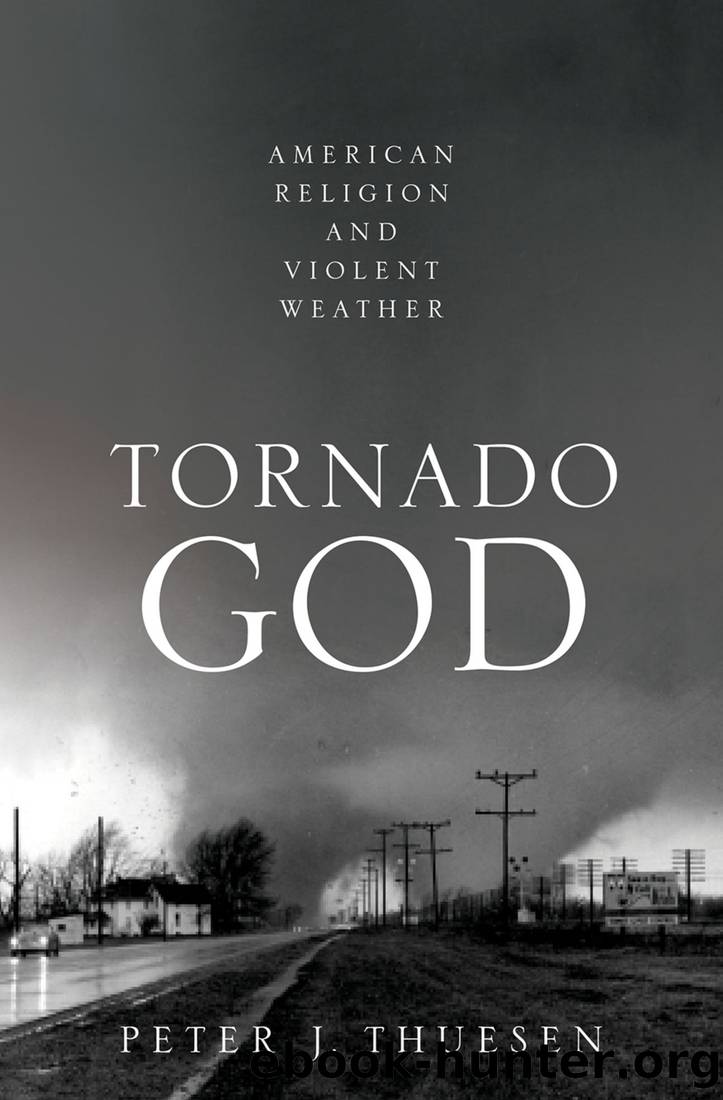Tornado God: American Religion and Violent Weather by Peter J. Thuesen

Author:Peter J. Thuesen
Language: eng
Format: mobi, azw3
Tags: United States, Non-Fiction, Weather, Religion
ISBN: 9780190680305
Publisher: Oxford University Press
Published: 2020-09-15T00:00:00+00:00
STORMS AND CLIMATE CHANGE: WHAT CAN HUMANS CONTROL?
Kushner weighed in again after Hurricane Sandy killed at least 230 people and left nearly $70 billion in damage along the US Atlantic seaboard in October 2012. âNature is value-free,â he told the Huffington Post. âGodâs role is not to decide where the hurricane goes and how severe it is. Godâs role is to motivate people to help neighbors and improve methods to predict hurricanes. God is found not in the problem, but in the resilience.â54 His focus on human action pointed to the question of societal responsibility in the face of storms. How natural are natural disasters? Do humans bear some complicityâeither through action or inactionâfor magnifying weather catastrophes? In recent years, as scientists have dubbed the present age the Anthropocene (the geological epoch in which human activity is the dominant influence on the environment), policymakers and religious leaders have debated two ways in which society is complicit in meteorological disasters.55 The first is in failing to prepare for, or respond adequately to, major storms, thereby compounding human suffering. The second is in actually altering the climate in ways that may increase the force or frequency of destructive weather.
The first problem was starkly evident after Hurricane Katrina in 2005. No event in modern US history seemed to disprove the pure âact of Godâ theory of natural disasters so convincingly. Though President George W. Bush called it a âblind and randomâ tragedy, Katrina was in fact a colossal failure of societal responsibility, especially toward the poor and racial minorities. As environmental historian Ted Steinberg showed in a devastating critique, the Bush administration had slashed funding for flood control even though the Federal Emergency Management Agency knew about the huge potential for loss of life. Katrina was nevertheless a âbipartisan disaster,â according to Steinberg, in that both Republicans and Democrats were committed to a neoliberalism that favored developers and other corporate interests over protecting societyâs most vulnerable members. Steinberg excoriated the âblind faith in the market coupled with rampant deregulationâ that led to unrestrained development up and down Americaâs coastline. Whereas black residents of the Lower Ninth Ward in New Orleans waited in vain for months for disaster assistance, Congress approved $148 million to restock beaches in Florida and elsewhere that had lost sand to erosion in four hurricanes in 2004. Beach nourishment was just one example of government subsidies that, like federal flood insurance, usually came with few restrictions on where developers could build new hotels and condominiums. Steinberg concluded that the federal government had repeatedly bailed out coastal property owners âin classic neoliberal fashion, just like it did the savings and loan industry.â Disaster relief, in other words, frequently goes to the haves rather than the have-nots.56
These racial and economic inequalities are sometimes overlooked in the aftermath of disasters, when responders cross boundaries of race and class in the cause of rebuilding. Historian James Hudnut-Beumler noticed this phenomenon among the faith-based groups, mostly white, that descended on the Gulf coast after Katrina.
Download
Tornado God: American Religion and Violent Weather by Peter J. Thuesen.azw3
This site does not store any files on its server. We only index and link to content provided by other sites. Please contact the content providers to delete copyright contents if any and email us, we'll remove relevant links or contents immediately.
Machine Learning at Scale with H2O by Gregory Keys | David Whiting(4313)
Never by Ken Follett(3955)
Fairy Tale by Stephen King(3396)
Reminders of Him: A Novel by Colleen Hoover(3116)
The Man Who Died Twice by Richard Osman(3077)
Will by Will Smith(2919)
It Starts With Us (It Ends with Us #2) by Colleen Hoover(2367)
Rationality by Steven Pinker(2363)
Can't Hurt Me: Master Your Mind and Defy the Odds - Clean Edition by David Goggins(2339)
Friends, Lovers, and the Big Terrible Thing by Matthew Perry(2230)
The Becoming by Nora Roberts(2201)
The Stranger in the Lifeboat by Mitch Albom(2120)
Love on the Brain by Ali Hazelwood(2075)
New Morning Mercies: A Daily Gospel Devotional by Paul David Tripp(1919)
A Short History of War by Jeremy Black(1848)
HBR's 10 Must Reads 2022 by Harvard Business Review(1843)
The Strength In Our Scars by Bianca Sparacino(1842)
A Game of Thrones (The Illustrated Edition) by George R. R. Martin(1744)
Never Finished: Unshackle Your Mind and Win the War Within by David Goggins(1712)
